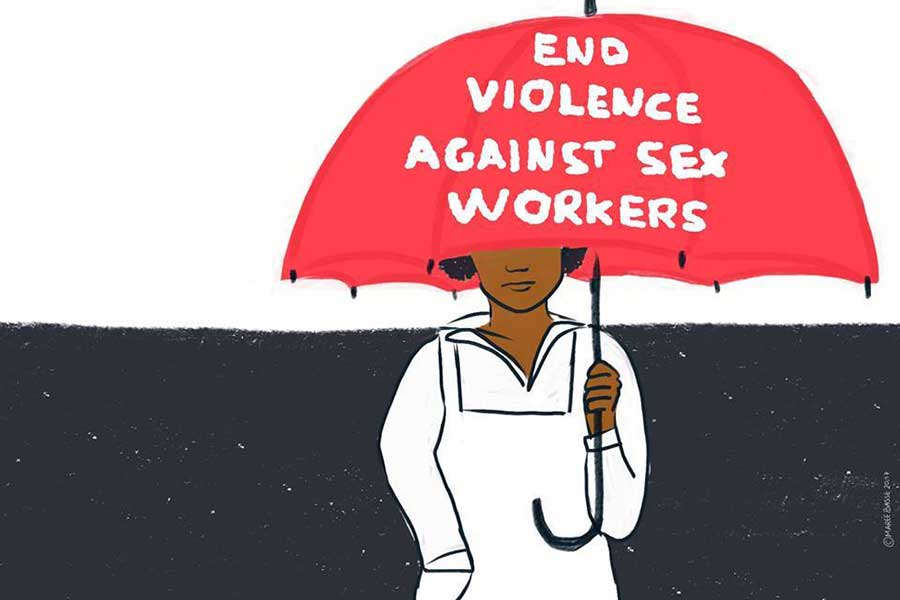Is tonight the night I will be attacked? Will I make it through my shift alive? Will one of my clients try to kill me?
These are thoughts that plague sex workers daily — especially trans sex workers — as violence against them becomes a growing concern in the LGBTQ community.
Despite the ongoing fear, many sex workers see little choice but to continue.
“Most of us have been kicked out of our homes, disowned by our families or have nowhere else to go,” said a local trans sex worker who goes by the name M. Damico and has spent the last four years working on Old York Road. “It’s not ideal and it’s dangerous, but we do what we have to do in order to survive.
“I’ve had johns get violent with me if they didn’t want to pay and others who have pulled weapons out on me. I’ve known some girls who have gotten killed on the job,” Damico said. “It’s hard to not think about that stuff, but that’s the reality. While some [workers] are out there getting cash to feed some sort of addiction, most of us are out there trying to make a life for ourselves.”
Damico said she and some of the other trans women who frequent the strip have limited opportunities for employment and can only provide for themselves through sex work.
Damico, 31, found herself without any source of income or a place to live when she was kicked out of her house after coming out to her family about her transition. The Somerset, N.J., native relocated to the city to get a fresh start, but said she couldn’t find a steady job and found herself in and out of shelters.
“I knew girls that worked on Old York Road and they seemed to get by with what they were making. At that point, that was my only option to getting back on track,” she said.
Damico said she didn’t like putting herself at risk, but the lifestyle afforded her the funds needed to buy basic necessities such as food, clothing and beauty products. She said she was able to save up enough money to rent a room. The relatively easy money, Damico said, came at a price.
Between January and November, the deaths of at least 26 sex workers were reported, according to the Sex Workers Education Advocacy Taskforce.
In 2015, 29 percent of all U.S. sex worker homicide victims were trans women or femme-presenting gender-nonconforming individuals who were sex workers, according to a report by The Sex Workers Outreach Project — a national social-justice network that advocates for the rights of sex workers. The Human Rights Campaign reported that since 2008, more than 2,300 transgender and gender-diverse people have been killed worldwide, most of them under the age of 30.
In recognition of the plight of people like Damico, local LGBTQ friendly groups will participate in the 15th annual International Day to End Violence Against Sex Workers Dec. 17. Sex workers, advocates and allies will join together worldwide to memorialize those who have lost their lives doing sex work.
In Philadelphia, the observance will feature a silent vigil at the Thomas Paine Plaza, 1401 JFK Blvd., from noon to 4 p.m. Separately, a discussion and presentation at PhilaMOCA will take place 7-10 p.m. The events will highlight stories of former and current sex workers.
The International Day to End Violence Against Sex Workers was founded by Dr. Annie Sprinkle and the Sex Workers Outreach Project USA, an American sex-workers’ rights organization. The day originally served as a memorial and vigil for the victims of the Green River Killer, Gary Ridgway, believed to have killed nearly 90 teenage girls and women in the 1980s and 1990s in the state of Washington. Ridgway was convicted of 49 of the murders, making him one of the most prolific serial killers in American history. Many, if not most, of his victims are believed to be sex workers.
A local sex worker who goes by the name BlakSyn said he hopes more people will participate this year to recognize that “sex work is valid work.”
“I began this work to inform people about what sex work is beyond what they may see in the media. It’s not always the drug addict or homeless person that partakes in sex work,” he said. “I became a sex worker not only for the income, but to explore sexual liberation for people of color.”
BlakSyn and other sex-worker advocates worldwide are calling for the decriminalization of sex work. He noted that decriminalized sex work can to lead to more protection for sex workers, a reduction in instances of STDs, sexual assault and violence as well as a decrease in human trafficking.
Earlier this year, Philadelphia District Attorney Larry Krasner tweaked the city’s stance on prostitution, directing his assistant D.A.s to “not charge prostitution cases against sex workers where a person who has been arrested has two, one or no prostitution convictions,” he said in a February statement.
